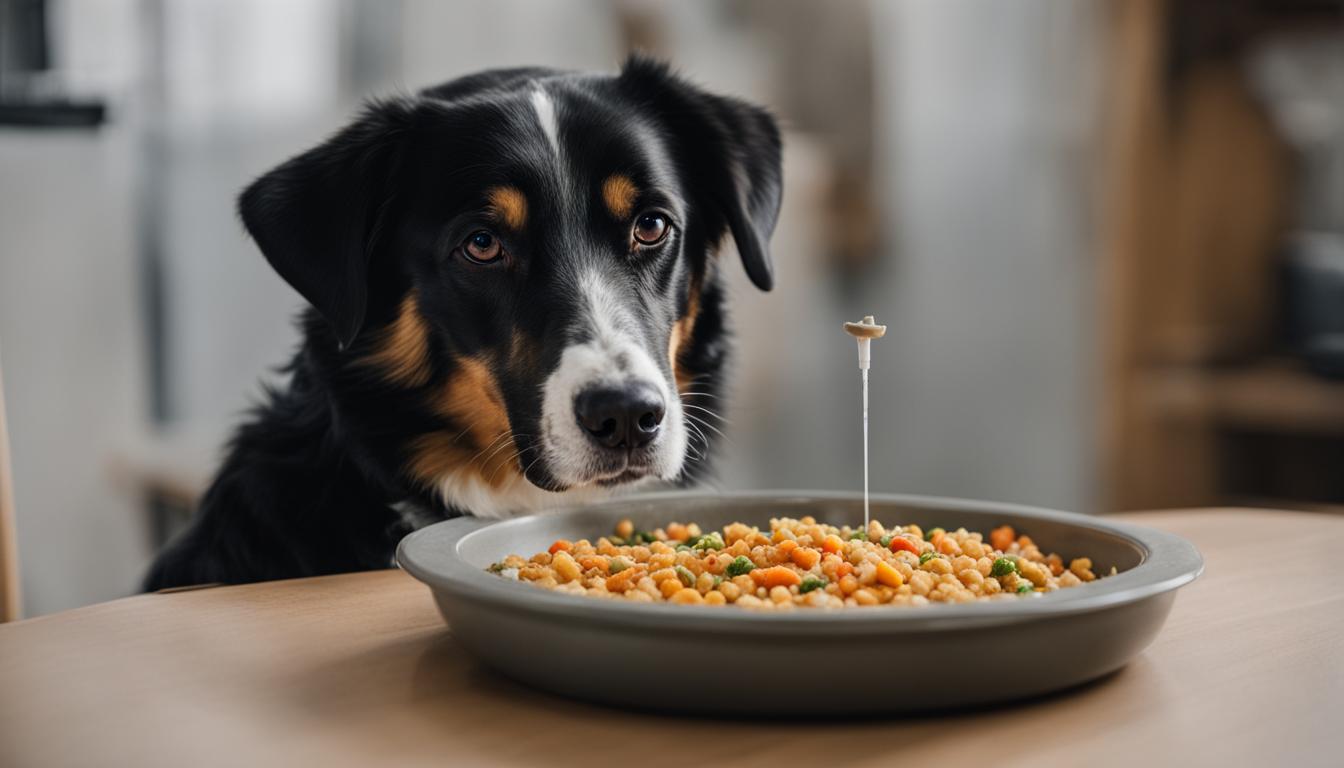If your beloved dog has been diagnosed with kidney failure, you may be wondering how to ensure they receive the nutrition they need to stay healthy. But force feeding a dog with kidney failure is a complex issue that requires careful consideration and professional guidance.
Is force feeding the right decision for your dog? The answer is not a simple yes or no. While your dog’s nutritional needs are undoubtedly important, you must also consider their overall well-being and quality of life.
In this section, we will delve into the question of whether or not you should force feed your dog with kidney failure. We’ll explore the factors you should consider, and the professional advice you need to make an informed decision.
Key Takeaways:
- Force feeding is not always necessary for dogs with kidney failure.
- Proper nutrition is crucial for managing the condition effectively.
- Consulting with a veterinarian is essential for making informed feeding decisions.
- Evaluating your dog’s appetite and eating habits can help determine the best feeding plan.
- Alternative options to force feeding exist and should be considered alongside this option.
Understanding Kidney Failure in Dogs
As a pet owner, it’s natural to want to do everything you can to help your furry friend when they’re not feeling well. But when it comes to kidney failure in dogs, it’s important to understand the disease and what treatment options are available before making a decision about how to proceed.
There are two main types of kidney failure in dogs: acute and chronic. Acute kidney failure is a sudden and potentially reversible condition that can be caused by things like dehydration, infection, or poison. Chronic kidney failure is a progressive and irreversible condition that is most often caused by age-related changes or underlying illnesses.
In some cases, dog parents may be faced with the decision of whether or not to force feed their pet. This is a difficult decision to make, and one that should only be done after consulting with your veterinarian and other experts. Some factors to consider include the severity of the kidney failure, the prognosis for recovery, and your dog’s quality of life.
Importance of Proper Nutrition for Dogs with Kidney Failure

If your dog has been diagnosed with kidney failure, providing proper nutrition is critical in managing the condition and maintaining their overall well-being. A renal diet, specifically formulated for dogs with kidney disease, is essential in providing the necessary nutrients while reducing the workload on the kidneys.
These diets typically have reduced levels of protein, phosphorus, and sodium, while increasing the levels of fiber and antioxidants. The goal is to prevent further damage to the kidneys and maintain healthy kidney function to the best of their ability.
Your veterinarian may also recommend additional supplements, such as omega-3 fatty acids and B vitamins, to support your dog’s overall health.
You may also need to make changes to the feeding schedule, such as smaller, more frequent meals, to avoid overloading the kidneys. It’s crucial to work closely with your veterinarian to develop a feeding plan that is tailored to your dog’s specific needs and to ensure that you are providing the optimal nutrition for their condition.
Evaluating Your Dog's Appetite and Eating Habits
As a pet owner of a dog with kidney failure, it is crucial to monitor your dog’s appetite and eating habits. This will help you determine if force feeding might be necessary, or if other options can be explored.
Start by observing your dog’s feeding behavior and tracking their food intake. Note the amount of food your dog consumes daily and how frequently they eat. It’s also vital to keep track of what type of food your dog eats and the supplements they take.
If your dog’s appetite starts to decrease or they begin to skip meals, this could be an indication of a potential issue. A decrease in appetite could be caused by many factors, such as nausea, constipation, or weakness.
One way to improve your dog’s appetite is by feeding your dog smaller, more frequent meals. This approach may help stimulate their appetite and make them feel more comfortable while eating. Additionally, you can try adding new, enticing flavours to your dog’s food to make it more appealing to them.
When to Consider Force Feeding
In some cases, force feeding may be necessary to ensure that your dog with kidney failure is receiving enough nutrients to maintain their health. However, it’s important to remember that force feeding should only be considered as a last resort and under the guidance of a veterinarian.
If your dog is showing signs of poor appetite or refusing to eat for more than a day, it’s important to consult with your veterinarian. They will be able to give you advice on how to encourage your dog to eat and may suggest alternative options before considering force feeding.
Consulting a Veterinarian

It’s important to remember that force feeding is not a decision to be made lightly. Before considering this option, it’s essential to consult with a veterinarian. They will be able to evaluate your dog’s overall health and provide you with guidance on feeding and nutrition.
Your veterinarian may also suggest alternative options to help improve your dog’s appetite and nutrient intake. These may include appetite stimulants, feeding tubes, or adjusting the diet to make it more palatable.
Ultimately, the decision of whether or not to force feed your dog with kidney failure should be based on their individual needs and under the guidance of a veterinarian.
Tips for Force Feeding Dogs with Kidney Failure
If your furry friend is experiencing kidney failure, you may need to consider force feeding to ensure they are getting the proper nutrition. Here are some tips and techniques to make the process easier and more comfortable:
1. Use a Syringe or Feeding Tube
Consider using a syringe or feeding tube to deliver food directly into your dog’s mouth or stomach. This method can be less stressful for your furry friend and allows for better control over the amount of food they are consuming.
2. Offer Small, Frequent Meals
Instead of force feeding large meals, break them into smaller, more frequent meals to avoid overwhelming your pup’s digestive system. This can also help stimulate their appetite and encourage them to eat on their own.
3. Modify the Diet
Adapt your dog’s diet to make it more appealing and easier to digest. Consider adding low-sodium broth, heating the food to enhance its aroma, or mixing in small amounts of human food (such as boiled chicken or rice) to entice your pup’s appetite.
4. Be Patient and Gentle
Force feeding can be stressful for both you and your dog, so it’s essential to approach the process with patience and gentleness. Speak in a soothing voice, offer treats and praise, and take breaks if needed.
5. Consult with Your Veterinarian
Your veterinarian is your best resource for guidance on force feeding and managing your dog’s kidney failure. Be sure to consult with them regularly to ensure your pup is receiving the appropriate care and nutrition.
By following these tips and techniques, you can ensure that your furry friend is receiving the proper nutrition they need to manage their kidney failure and maintain their overall health.
Alternative Options to Force Feeding
If your dog is not responding to force feeding or if you are uncomfortable with the idea, there are alternative options to consider. These methods may include:
- Alternative Feeding Methods: There are several alternative feeding methods to consider, including syringe feeding, feeding tubes, or hand-feeding small portions throughout the day. These methods can help ensure your dog receives the necessary nutrition without forcing them to eat.
- Appetite Stimulants for Dogs: Your veterinarian may prescribe medication to stimulate your dog’s appetite. These medications can help encourage your dog to eat and may make force-feeding unnecessary.
- Veterinary Intervention: In some cases, underlying medical conditions or side effects of medication may be causing your dog’s lack of appetite. Your veterinarian can help identify and treat these issues to help improve your dog’s eating habits.
It’s important to discuss these options with your veterinarian before deciding on a course of action. Your vet can provide expert guidance on which option is best suited for your dog’s specific needs.
Conclusion
In conclusion, the decision of whether or not to force feed a dog with kidney failure can be a tough one. It’s essential to understand the condition and its symptoms, as well as your dog’s individual needs and eating habits. Providing proper nutrition is crucial, and following a renal diet and feeding guidelines can help manage the condition effectively.
At the end of the day, making feeding decisions for a dog with kidney failure should prioritize their well-being and comfort. With the right information, guidance, and care, you can help manage the condition and provide your furry friend with the best possible quality of life.
Frequently Asked Questions (FAQs)
Should I force feed my dog with kidney failure?
The decision to force feed a dog with kidney failure should be made in consultation with a veterinarian. Force feeding may be necessary in certain cases to ensure adequate nutrition, but it is important to evaluate your dog’s overall health and appetite before making this decision.
What are the causes of kidney failure in dogs?
Kidney failure in dogs can have various causes, including age-related degeneration, certain medications, infections, and underlying health conditions. It is best to consult with a veterinarian to determine the specific cause of your dog’s kidney failure.
What are the symptoms of kidney failure in dogs?
Symptoms of kidney failure in dogs may include increased thirst and urination, loss of appetite, weight loss, vomiting, and lethargy. If you notice any of these symptoms in your dog, it is important to seek veterinary care for proper diagnosis and treatment.
Why is proper nutrition important for dogs with kidney failure?
Providing proper nutrition is crucial for dogs with kidney failure as it helps manage the condition and maintain overall health. A renal diet, specifically formulated for dogs with kidney disease, can help reduce the workload on the kidneys and minimize the buildup of waste products.

